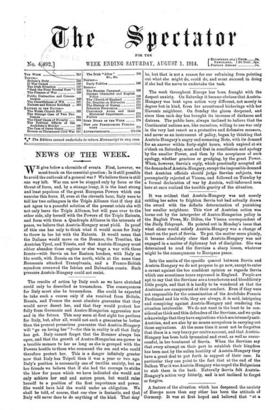The week throughout Europe has been fraught with the deepest
anxiety. On Saturday it became obvious that Austria- Hungary was bent upon action very different, not merely in degree but in kind, from her accustomed bickerings with her Slavonic neighbour. On Sunday the gloom deepened, and since then each day has brought its increase of darkness and distress. The public here, always inclined to believe that the Continental nations are, like ourselves, willing to use war only in the very last resort as a protective and defensive measure, and never as an instrument of policy, began by thinking that Austria-Hungary's angry and menacing Note, with its demand for an answer within forty-eight hours, which expired at six o'clock on Saturday, must end first in conciliation and apology by the smaller Power, and then by the acceptance of such apology, whether gracious or grudging, by the great Power. When, however, Servia's reply, which practically accepted all the demands of Austria-Hungary, except the impossible demand that Austrian officials should judge Servian subjects, was peremptorily rejected at Vienna, and followed on Tuesday by a formal declaration of war by Austria, well-informed men here at once realized the terrible gravity of the situation.


































